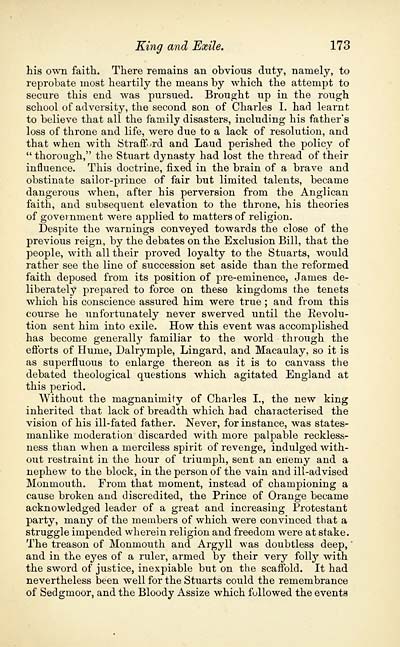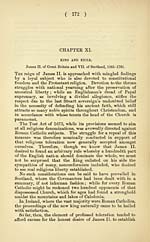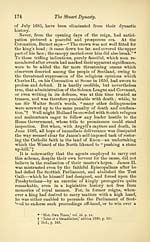Stuart dynasty
(193) Page 173
Download files
Complete book:
Individual page:
Thumbnail gallery: Grid view | List view

King and Exile. 173
his own faith. There remains an obvious duty, namely, to
reprobate most heartily the means by which the attempt to
secure this end was pursued. Brought up in the rough
school of adversity, the second son of Charles I. had learnt
to believe that all the family disasters, including his father's
loss of throne and life, were due to a lack of resolution, and
that when with Strafford and Laud perished the policy of
" thorough," the Stuart dynasty had lost the thread of their
influence. This doctrine, fixed in the brain of a brave and
obstinate sailor-prince of fair but limited talents, became
dangerous when, after his perversion from the Anglican
faith, and subsequent elevation to the throne, his theories
of government were applied to matters of religion.
Despite the warnings conveyed towards the close of the
previous reign, by the debates on the Exclusion Bill, that the
people, with all their proved loyalty to the Stuarts, would
rather see the line of succession set aside than the reformed
faith deposed from its position of pre-eminence, James de-
liberately prepared to force on these kingdoms the tenets
which his conscience assured him were true ; and from this
course he unfortunately never swerved until the Bevolu-
tion sent him into exile. How this event was accomplished
has become generally familiar to the world through the
efforts of Hume, Dalrymple, Lingard, and Macaulay, so it is
as superfluous to enlarge thereon as it is to canvass the
debated theological questions which agitated England at
this period.
Without the magnanimity of Charles I., the new king
inherited that lack of breadth which had characterised the
vision of his ill-fated father. Never, for instance, was states-
manlike moderation discarded with more palpable reckless-
ness than when a merciless spirit of revenge, indulged with-
out restraint in the hour of triumph, sent an enemy and a
nephew to the block, in the person of the vain and ill-advised
Monmouth. From that moment, instead of championing a
cause broken and discredited, the Prince of Orange became
acknowledged leader of a great and increasing Protestant
party, many of the members of which were convinced that a
struggle impended wherein religion and freedom were at stake.
The treason of Monmouth and Argyll was doubtless deep, '
and in the eyes of a ruler, armed by their very folly with
the sword of justice, inexpiable but on the scaffold. It had
nevertheless been well for the Stuarts could the remembrance
of Sedgmoor, and the Bloody Assize which followed the events
his own faith. There remains an obvious duty, namely, to
reprobate most heartily the means by which the attempt to
secure this end was pursued. Brought up in the rough
school of adversity, the second son of Charles I. had learnt
to believe that all the family disasters, including his father's
loss of throne and life, were due to a lack of resolution, and
that when with Strafford and Laud perished the policy of
" thorough," the Stuart dynasty had lost the thread of their
influence. This doctrine, fixed in the brain of a brave and
obstinate sailor-prince of fair but limited talents, became
dangerous when, after his perversion from the Anglican
faith, and subsequent elevation to the throne, his theories
of government were applied to matters of religion.
Despite the warnings conveyed towards the close of the
previous reign, by the debates on the Exclusion Bill, that the
people, with all their proved loyalty to the Stuarts, would
rather see the line of succession set aside than the reformed
faith deposed from its position of pre-eminence, James de-
liberately prepared to force on these kingdoms the tenets
which his conscience assured him were true ; and from this
course he unfortunately never swerved until the Bevolu-
tion sent him into exile. How this event was accomplished
has become generally familiar to the world through the
efforts of Hume, Dalrymple, Lingard, and Macaulay, so it is
as superfluous to enlarge thereon as it is to canvass the
debated theological questions which agitated England at
this period.
Without the magnanimity of Charles I., the new king
inherited that lack of breadth which had characterised the
vision of his ill-fated father. Never, for instance, was states-
manlike moderation discarded with more palpable reckless-
ness than when a merciless spirit of revenge, indulged with-
out restraint in the hour of triumph, sent an enemy and a
nephew to the block, in the person of the vain and ill-advised
Monmouth. From that moment, instead of championing a
cause broken and discredited, the Prince of Orange became
acknowledged leader of a great and increasing Protestant
party, many of the members of which were convinced that a
struggle impended wherein religion and freedom were at stake.
The treason of Monmouth and Argyll was doubtless deep, '
and in the eyes of a ruler, armed by their very folly with
the sword of justice, inexpiable but on the scaffold. It had
nevertheless been well for the Stuarts could the remembrance
of Sedgmoor, and the Bloody Assize which followed the events
Set display mode to:
![]() Universal Viewer |
Universal Viewer | ![]() Mirador |
Large image | Transcription
Mirador |
Large image | Transcription
Images and transcriptions on this page, including medium image downloads, may be used under the Creative Commons Attribution 4.0 International Licence unless otherwise stated. ![]()
| Histories of Scottish families > Stuart dynasty > (193) Page 173 |
|---|
| Permanent URL | https://digital.nls.uk/94820082 |
|---|
| Description | A selection of almost 400 printed items relating to the history of Scottish families, mostly dating from the 19th and early 20th centuries. Includes memoirs, genealogies and clan histories, with a few produced by emigrant families. The earliest family history goes back to AD 916. |
|---|

